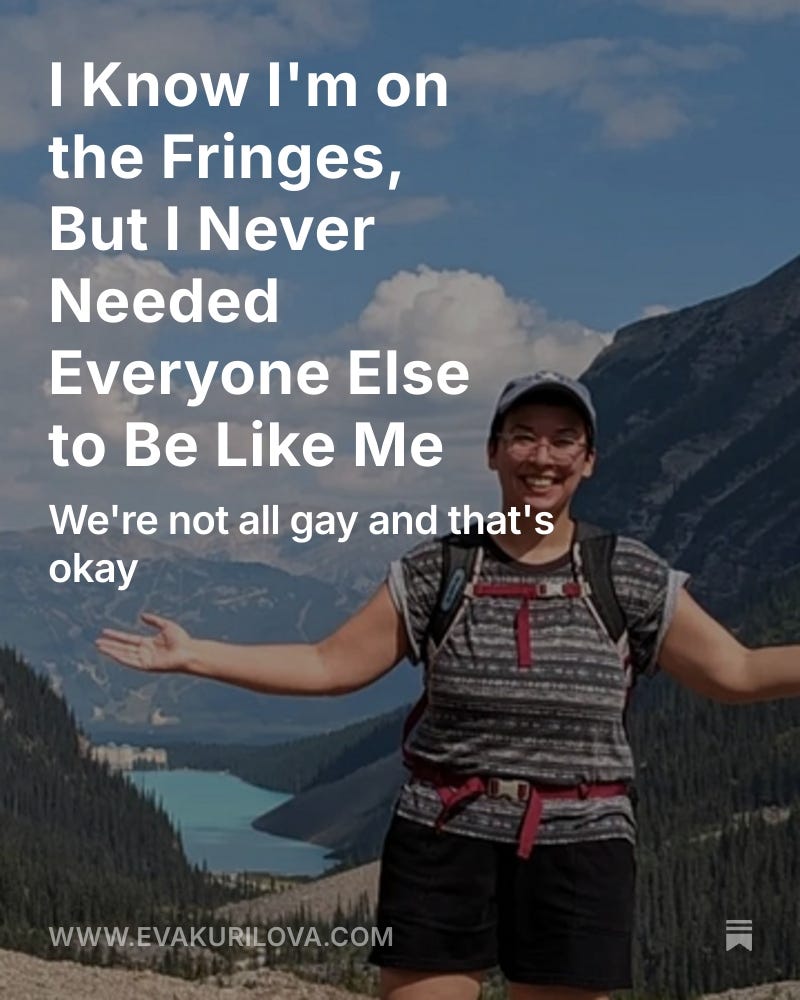Disagreement Isn't Hate
If I can understand this, then I don't give anyone else a pass

Charlie Kirk believed that marriage is between a man and a woman and that children should be raised by a mother and a father. Now, I have a wife and we have a daughter, but I don't have a big enough victim complex to believe that he would have hated me, or that he hated gay people in general. In fact, I think we would have gotten along quite well and seen eye to eye on the importance of treating people as individuals. I am much more wary of those who frame his beliefs and opinions as hateful, and I want nothing to do with people who use them to excuse his murder. As for those who celebrated—I'd like to forget I even share the world with them, even though most of them probably support gay marriage.
I did not know Kirk before he was assassinated beyond a name, face, and political leanings. It is to my dismay that I only learned afterwards what he did and how he tried to encourage dialogue. It has hit me hard to find out just how good he actually was; how firm in his beliefs but tempered in his approach to others. I've come across clips of him expressing opinions I very much agree with or otherwise respect. And then I come across people attributing to him hate, hate—and I think, how blissfully, proudly, and wilfully ignorant you are.
As I said on X, I would so much rather live among people who don't want me to get married than people who want to kill people who don't want me to get married. I'll add in those who would celebrate, condone, or justify such a murder. And yes, I realize that people took issue with many of Kirk's views besides those on homosexuality. But seeing as immediately after his murder many began spreading the falsehood that he advocated stoning gays to death, I think it is a pertinent example of just how misrepresented and maligned all of his views—and in fact his entire character—really were.
None of this is to say that murdering, or celebrating, or justifying the murder of a more unpleasant person with more offensive views would be any less wrong. But I think the reason this has struck a chord with so many, including myself, is that it has become obvious that normal people with normal views have been elevated to the level of literal Nazis, which excuses violence against them. Note, I was initially going to write “normal as of 10 years ago,” but that isn't true. Many people agree with a lot, or at least some of what Kirk had to say. A lot of them just don't know it because his views have been misrepresented, or they don't realize how unacceptable their own normal and reasonable views have become in the current political climate.
And then of course there's the fact that it struck a chord because he fundamentally meant well, and he was a husband and a father of two young kids, and it's all just really sad.
I can't understand the level of hatred that would drive someone to murder a person because they disagree with them. Thankfully, I think most other people don't understand this either. But what a shocking number of people have shown is that they will celebrate, justify, or excuse such a murder, and that’s what really scares and upsets me. We've reached a point where strong enough disagreement can be used to condone deadly violence.
This is, quite frankly, insane to me. Some of the people I have been most drawn to in my life are people who had different opinions and ideas on some pretty fundamental questions. Politically, I've been friends with or admired people ranging from staunch traditional conservatives to Marxists, whereas I’d probably fall somewhere closer to a classical Liberal, which I'd argue is today’s small “c” conservative. (To be totally honest, I'm ideologically a libertarian at heart, but I'm also not an idealist, so I don't believe in pursuing my ideal world). On a spiritual or religious level, I've loved people who are deeply religious and people who are completely atheist, whereas I love God and have a fondness for religion (I have a Bachelor's degree in religious studies) but would never be able to fall into either camp.
I've liked these people because I like them first and foremost as people, and the areas where we differ are the result of them daring to think, even if their thinking leads them to a different conclusion than my own. In my younger days, I lamented that a particular friend saw nothing of value in any kind of spirituality. Today, I try to appreciate everyone I respect for exactly who they are, because the totality of who they are makes them a person I respect.
I also find it hard to lob accusations of, for example, misogyny and homophobia at people for stating beliefs that they truly think would lead to a better world. Kirk, for example, didn't base his ideas about marriage from a place of hating women and gays but from a belief that God ordered things a certain way for the maximum benefit of men, women, and children. I think the vision he shared is a positive one for many people. I just think my place in the world is meant to be a little different.
I am a millennial woman, and a lesbian to boot. I was one of the main demographic targets for the postmodern, queer theory-saturated progressive victimhood culture. But I never wanted to be a victim, and I'll never make the mistake of thinking anyone hates me just because of their political views or religious beliefs. Some men do actually hate women, and many people in this world actually hate gays; it's true. But that's why it is so abhorrent to me that I should pretend to find additional enemies in people who don't actually hate me and the groups I belong to. And Charlie Kirk didn't.
In a world that has no shortage of real monsters, the desire to create boogeymen out of people for their beliefs and opinions is incredibly misguided, at best. If I could fight against this impulse amidst a culture that encouraged me to embrace it, then I really can't excuse it in anyone else. Disagreement isn’t hate, and confusing the two is a fatal mistake.


Charlie would have welcomed you into his movement and highlighted all your common areas of agreement. ❤️
This essay is a classic example of red-pilling through affective identification and selective framing, made all the more striking because it comes from someone who would, by any objective measure, have been excluded from Charlie Kirk’s political vision of a properly ordered society.
Let’s unpack the rhetorical and ideological moves happening here:
1. Affective Identification Overrides Structural Reality
"I don't have a big enough victim complex to believe that he would have hated me."
This is a privatization of politics—a move from structural critique to interpersonal projection. Rather than engaging with what Kirk’s policies and messaging advocated for in practice, the speaker projects an imagined friendship, one in which Kirk "wouldn’t have hated me," thereby absolving him of ideological accountability. This is akin to saying, “My uncle is racist but he loves me.” It erases the public implications of someone's political platform in favor of personal feelings of imagined rapport.
2. Strategic Mischaracterization of Critics
"People began spreading the falsehood that he advocated stoning gays to death."
This straw-man move allows the speaker to dismiss all critique as grotesquely exaggerated. By highlighting an absurd or unrepresentative accusation, she delegitimizes the broader and far more accurate charge: that Kirk promoted a worldview rooted in Christian nationalist sexual ethics, which excludes, delegitimizes, and ultimately aims to roll back the rights of gay families like hers.
This is not misrepresentation; it’s textbook reactionary ideology with a polished delivery system.
3. The “Tone” Defense & Civility Trap
"He was firm in his beliefs but tempered in his approach to others."
This common red-pill maneuver prioritizes tone over substance. Kirk may not have shouted slurs (in public), but he worked tirelessly to advance anti-LGBTQ+, anti-immigrant, and anti-democratic rhetoric and policy goals. This framing treats style as character, which is both politically naïve and deeply dangerous in a time when extremist politics are increasingly dressed up in soft affect.
4. Libertarianism as a Shield
"I'm ideologically a libertarian at heart, but I'm also not an idealist..."
Libertarianism often functions as an exit ramp from solidarity. In this case, it allows the speaker to opt out of hard political questions by cloaking her worldview in neutrality, despite having already made a clear value judgment in favor of someone who sought to deny her family’s legitimacy.
5. Victimhood Inversion
"Normal people with normal views have been elevated to the level of literal Nazis, which excuses violence against them."
This is a classic inversion of victimhood. Kirk, who spent years calling LGBTQ+ people a threat to children and pushing disinformation about elections, is now portrayed as a “normal” man persecuted by a hysterical left that allegedly “equates disagreement with Nazism.”
This rhetorical move obscures the reality that Kirk, while not a Nazi, aligned himself with deeply authoritarian and anti-pluralist forces—and did so with precision, calculation, and massive influence.
6. Sentimentality as Political Cover
"He was a husband and a father of two young kids, and it’s all just really sad."
This is where pathos becomes manipulation. The tragedy of the murder is real—but it is being used here to foreclose legitimate critique, to sanitize Kirk's ideology, and to portray those who maintain political memory as somehow monstrous for not participating in the grief. The speaker allows no space for truth-telling in the face of death—only myth-making.
Final Thought
This person has been emotionally red-pilled by a potent blend of mourning, media ambiguity, and liberal discomfort with moral clarity. And because she presents herself as a reasonable, complex, tolerant person, her position becomes especially seductive to other centrists, liberals, or identity liberals looking for a way to dodge uncomfortable truths about the right.
This is precisely how red-pilling works in 2025: not with jackboots, but with podcasts, parenting photos, and imagined friendships with people who would happily legislate away our rights—gently, but completely.